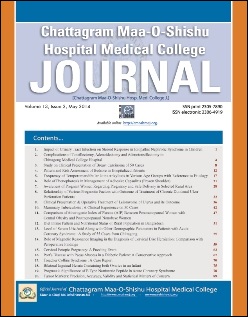Prognostic Significance of B Type Natriuretic Peptide in Acute Coronary Syndrome
DOI:
https://doi.org/10.3329/cmoshmcj.v13i2.21079Keywords:
Acute coronary syndrome (ACS), B-type natriuretic peptide (BNP), risk stratificationAbstract
Acute Coronary syndrome (ACS) is the most common cause of admission to the coronary care unit with highest risk of death and adverse outcomes. ACS accounts for 6070% of all admissions in the hospital. Patients with ACS encompass a heterogeneous group that varies widely regarding severity of the underlying coronary artery disease, prognosis and response to treatment. Patients with the highest risk of subsequent events usually have the largest benefit of an intensified pharmacological treatment and early mechanical intervention. The prognosis for low-risk patients, on the other hand, is often difficult to improve further and these patients usually benefit more from a conservative management with a lower risk of side effects. Therefore, risk stratification is essential and should be initiated early and updated continuously throughout the hospital stay. Early risk stratification is usually performed by the use of clinical background factors, clinical presentation, electrocardiography and biochemical markers of myocardial damage. Levels of natriuretic peptides have been shown to reflect cardiac performance. The aim of this study was to review elaborately on B type Natriuretic Peptide (BNP) and its prognostic value in patient with ACS. This review focuses on the emerging role of these peptides in the early risk stratification of ACS patients. Elevation of BNP levels in acute MI and UA is predictive of a greater risk of death, post infarction heart failure, or reinfarction. Post infarction studies demonstrate that elevated plasma BNP levels are associated with larger infarct size, increased probability of ventricular remodeling, lower ejection fraction, higher risk of heart failure, and increased mortality. This cardiac marker is a potent predictor of mortality in patients with all forms ACS. BNP measurements serve as an index of severity of the ischemic injury, as well as the degree of impairment in left ventricular function.
Downloads
244
294
Downloads
Published
How to Cite
Issue
Section
License
Authors of articles published in CMOSHMC Journal retain the copyright of their articles and are free to reproduce and disseminate their work.
A Copyright and License Agreement -signed and dated by the corresponding author on behalf of all authors -must be submitted with each manuscript submission.

